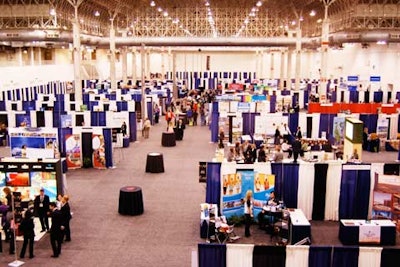
The Hospitality Sales and Marketing Association International hosted its Affordable Meetings Mid-America exhibition and conference at Navy Pier on Wednesday and Thursday. More than 200 booths, which represented everything from hotels to meeting-sign manufacturers, took over the pier's Festival Hall.
Upstairs, meeting rooms offered educational sessions that covered topics ranging from hybrid events to legal issues and job-hunting tips for planners over the age of 50.
Michael Kushner, vice president of digital media strategy at UBM Studios, lead a session entitled "Mix It Up: Integrating Virtual Events Into Your Business." As he did in his session at the recent MeetingTech Online Summit in Rosemont, Kushner delved into some of the perceived benefits of virtual and hybrid events. He emphasized his belief that virtual events are not meant to replace the work an event planner does, but to enhance those efforts. Virtual events allow a happening to have greater reach and bring in a higher-quality demographic, he said, pointing out that many C-level executives can't get away from their desks long enough to attend physical meetings, but can find the time to log into hybrid events.
According to Kushner, another benefit of virtual events is comprehensive back-end reporting. At virtual trade shows, for example, typed conversations between booth reps and guests are all transcribed, data is collected as guests register, and planners can track all the booths that attendees visit, as every action takes place online.
Josh Grimes, attorney at law at Grimes Law Offices L.L.C., led a simultaneous session called "Make It Legal: Essential Contract Clauses for a Recovering Economy." Part of Grimes's session focused on hotel quality. He polled the audience on whether they believe hotel quality is part of a meeting contract, is merely implied, or doesn't factor in. "The answer is, we don't know," he said. "It's a question lawyers like to ponder."
In the end, Grimes said, if planners want to ensure that a meeting space will not—for example—have tattered rugs or peeling wallpaper, they should work it into their contract with the venue. And, if it's important for a planner to do business with a particular hotel brand (Grimes mentioned that some hosts want to stick with a certain chain to rack up reward points), it's also important to draft a clause that lets hosts escape the contract if a hotel suddenly gets rebranded.
Carroll Reuben, event director of the Kansas-based Meeting Excellence, offered tips for senior planners looking for new jobs in a session called "Age Is Just a Number—and Mine Is Unlisted." Working off the premise that employers can be unfairly reluctant to hire planners over the age of 50, Reuben's session offered tips in promoting one's own experience. Among her suggestions: File daily to-do lists, and use them to make 30-, 60-, and 90-day outlines of recent accomplishments.



















